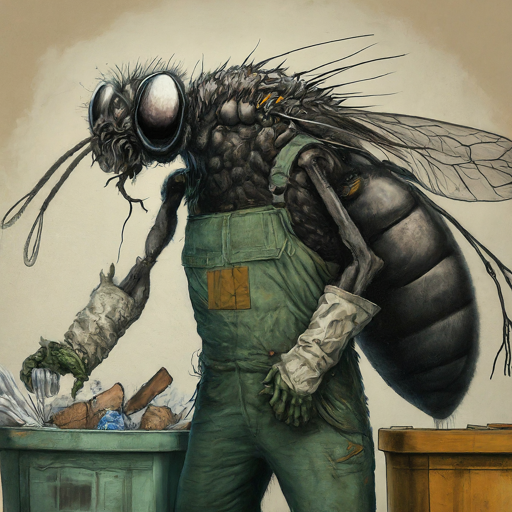Black Soldierfly for a novel municipal household waste management mechanism in Kathmandu Valley

Estimated reading time: 6 minutes
The thesis of this proposal is to solve municipal waste management using BSFL (black soldier fly larvae) in Kathmandu. BSFL is profit on all sides: the city gives money to get rid of their organic waste, the frass that’s generated by BSFL can be slightly amended and sold to farmers for great profit, and the protein mass of the BSFL themselves can be sold as live (or processed, shelf-stable) feed for birds, fish, zoo animals, pets etcetera. Additionally, the process reduces the mass of organic waste by 80%, thus saving precious dumping ground space near Kathmandu. This also allows for ‘circular economy’ where Kathmandu valley does not ‘waste’ any of the important resources, and recycles imported food material right back into the economy.
1. Introduction
Kathmandu, like many major cities, faces challenges in managing its ever-growing organic waste stream. Traditional methods like landfilling are unsustainable, occupying valuable space and posing environmental risks. This proposal presents a novel and profitable solution:utilizing Black Soldier Fly Larvae (BSFL) for organic waste management.
2. Problem Statement
-
Kathmandu generates X tons of organic waste daily, placing incredible pressure on landfills nearing capacity.
-
Current methods lack efficiency, leading to environmental pollution and resource underutilization.
-
The city seeks sustainable and cost-effective solutions for organic waste management.
 3. Proposed Solution: BSFL Technology
3. Proposed Solution: BSFL Technology
BSFL technology offers a multifaceted solution:
-
Waste reduction: BSFL can bioconvert 80% of organic waste into valuable resources.
-
Frass production: Frass, the byproduct of BSFL digestion, is a nutrient-rich fertilizer saleable to farmers.
-
Protein production: BSFL larvae are a high-protein source for animal feed, saleable to poultry farms, fisheries, and pet food producers.
-
Circular economy: This process creates a closed-loop system, recycling nutrients within Kathmandu Valley.
4. Benefits
-
Reduced landfill waste: Extends the lifespan of existing landfills and saves valuable space.
-
Environmental benefits: Lowers greenhouse gas emissions and minimizes pollution compared to traditional methods.
-
Economic benefits: Generates revenue from frass and BSFL sales, creating a sustainable business model.
-
Job creation: Creates employment opportunities in BSFL rearing, processing, and marketing.
-
Improved public health: Reduces disease risks associated with overflowing landfills and improper waste disposal.
5. Pilot Project
We propose a pilot project in a designated Kathmandu district to:
-
Show technical feasibility and gather data on waste reduction, frass quality, and BSFL production.
-
Refine the process based on pilot results before full-scale implementation.
-
Build community acceptance and address potential concerns.
6. Implementation Plan
The pilot project will involve:
-
Securing a suitable location: Partnering with existing waste management facilities or establishing a dedicated site.
-
Acquiring BSFL breeding stock and equipment: Setting up infrastructure for larvae rearing and processing.
-
Collecting organic waste: Collaborating with households and businesses for waste collection and transportation.
-
Monitoring and evaluation: Continuously tracking waste reduction, frass quality, BSFL production, and economic viability.
7. Scalability and Sustainability
Following a successful pilot, the project will be scaled up city-wide in phases. Partnerships with waste management companies, farmers’ cooperatives, and animal feed producers will ensure long-term sustainability and market access.
8. Regulatory Framework
We will work with relevant authorities to establish any necessary regulatory frameworks to support the project’s success.
9. Conclusion
BSFL technology offers a promising, sustainable, and profitable solution for Kathmandu’s organic waste management challenges. This proposal outlines a pilot project and implementation plan to show its feasibility and allow for a cleaner, greener, and more resource-efficient Kathmandu.
10. Call to Action
We urge the Council of Ministers to consider this proposal and approve the pilot project. We are confident that BSFL technology can significantly contribute to a more sustainable and prosperous Kathmandu.
Strengths:
- Addresses multiple problems: This proposal tackles several critical issues simultaneously: organic waste management, circular economy, and resource utilization.
- Profitable solution: The model generates revenue from selling frass and BSFL, addressing sustainability concerns.
- Reduces landfill stress: Decreasing organic waste by 80% significantly alleviates pressure on limited landfill space.
- Creates local jobs: This initiative can offer employment opportunities within Kathmandu Valley.
Suggestions for improvement:
- Pilot project: Propose a pilot project on a smaller scale to show feasibility, gather data, and refine the process before full-scale implementation.
- Cost-benefit analysis: Include a detailed cost-benefit analysis showing the project’s economic viability and potential return on investment.
- Partnership strategies: Identify potential partners, such as waste management companies, farmers’ cooperatives, and animal feed producers, to ensure long-term sustainability and market access.
- Environmental impact assessment: Include an assessment of the project’s potential environmental impacts, such as greenhouse gas emissions or water usage.
- Social considerations: Address potential social impacts, such as job displacement in informal waste pickers and potential odor concerns near the facility.
- Scalability plan: Outline a clear plan for scaling up the project to city-wide implementation after a successful pilot.
- Regulatory framework: Discuss potential regulatory needs or adjustments to support the project’s success.
Additional points:
- Highlight local context: Tailoring the proposal to Kathmandu’s specific waste composition, available resources, and cultural context will strengthen its relevance.
- Data and evidence: Back up your claims with research data on BSFL technology, similar projects in other regions, and local waste management statistics.
- Clear implementation plan: Define a clear timeline, responsible parties, and budget allocation for each project phase.
- Sustainability considerations: Address the project’s long-term sustainability, including waste generated from the BSFL operation and its management.
By incorporating these suggestions and conducting thorough research, you can create an alluring proposal that increases the chances of approval and successful implementation.
Remember, consulting with relevant stakeholders like scientists, environmental experts, and community representatives can enrich your proposal and enhance its chances of success.
